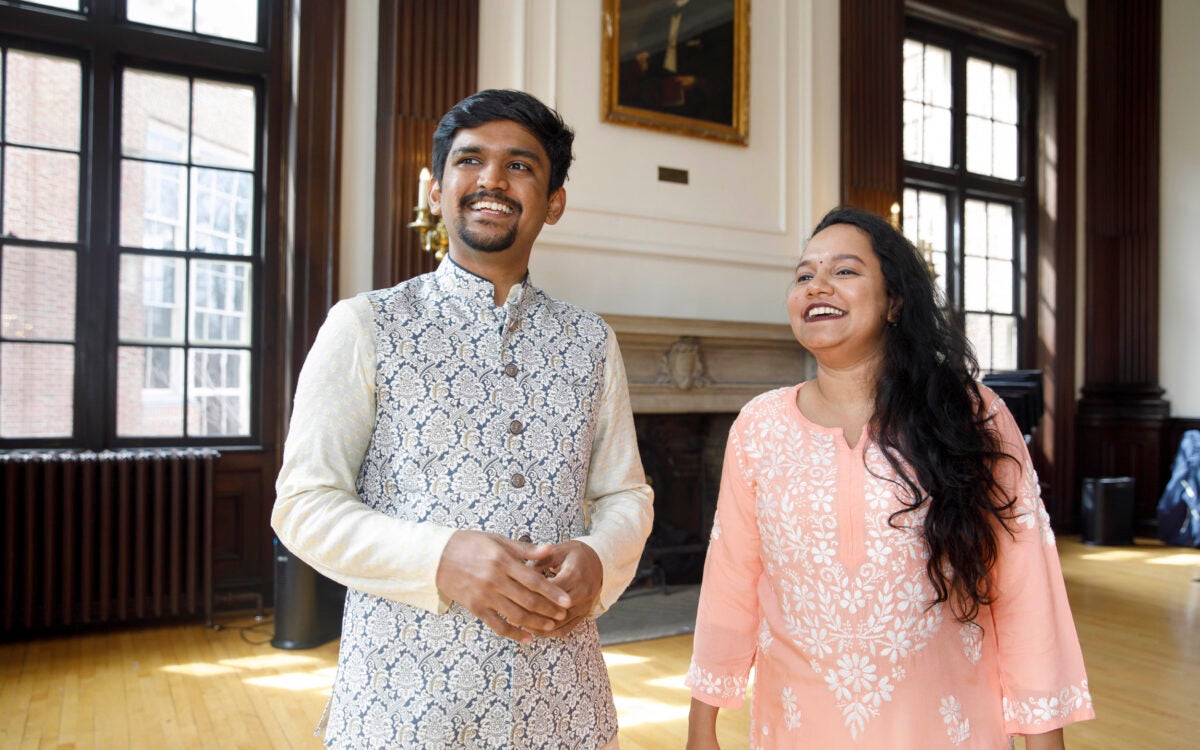Wholly (and holy) organic
New Divinity School garden a kind of sacred space
At Harvard Divinity School (HDS), we talk a lot about gardens — the biblical fruits of Eden, the blissful states of Sukhavati, the verdant blessings of Al-Janna — and now we too have a pluralist plot of paradise: the HDS Community Garden.
This space was converted from lawn to lushness three years ago, through a combined effort of HDS staff (the HDS Green Team) and students (members of the student group EcoDiv). Thanks to them, we now have a holy, wholly organic garden, with garlic already on the rise.
It was here, halfway through the first season and my first semester, that I received my own baptism by soil, anointed by the dirt under my nails as I dug into the ground, pulling up pound after pound of the most beautiful golden potatoes I’d ever seen. It was love. Hours later, we roasted those potatoes for the community and I dug in once more: CHOMP!
With that bite, the covenant was formed. The next season, spring to fall 2010, I took on some real responsibilities as one of two student garden managers. My green-thumbed partner was and is Grace Egbert (M.T.S. ’12). Along with Leslie MacPherson Artinian in the Office of Ministry Studies, we expanded the project, helping the garden to grow to nearly 1,000 square feet of sacred space (though isn’t all space such?). With a Student Sustainability Grant courtesy of the Office for Sustainability, we were able to add some serious infrastructure: tomato towers, cucumber trellises, raised beds, even a drip irrigation system to reduce water waste and create a sustainable, localized food system.
I’ve learned a lot through my study of environmental ethics here at Harvard, but the garden has really been where the rubber meets the road, or more appropriately, the shovel meets the soil. Through a lived relationship with this community of plants, animals, and people, I’ve come to be me. I’ve learned to live in a world that is borderlands, transgressing the boundaries of human-nature dualism, dwelling in a community of life abundant. Is a comparison to the concept of Pure Land really out of the question here?
My most important learning has been this: Nature is so much more than a pristine forest atop the mountain. In the garden that is the world, nature is something familiar — us yet not quite — something near enough to love yet other enough to welcome us back into a forgotten covenant. Try to rope it in, to pound it into rows, and the plants will remind you of what’s what. A bean plant reaches out to the cucumbers, joining tendrils and becoming friends. A group of greens stubbornly reseed themselves throughout the garden. Even the squirrels can set us straight, raiding the trash to plant a kernel of corn, our single ear that year. Too many tomatoes? No problem. Squirrels like them too.
Like them, eating is our most basic connection to nature, wholly obfuscated by the modern industrialized food system. I believe growing gardens is one of the most radical acts in which we can engage. By re-entering a direct relationship with other forms of life, we can see rightly once more. We can say, with a single bite of a fresh tomato, still holding that earthy smell that comes after a summer’s rain, that this relationship matters — that pesticides, chemical additives, and plastic packaging can’t take this away, that nothing can.
At HDS, we’ve been fortunate that the community has been open to building these relationships. Once people tasted the bounties of this space, the joy of communal work, the peace of respite, a rainbow of colors — heirloom tomatoes, eggplant, greens, carrots, squash blossoms — our garden has grown and grown. This bounty was shared at more than 20 School-wide events last year, including a harvest festival turned dance of gratitude around the garden.
In the garden, we co-create with the sun and the rain and the earth, participating in the divine. I urge everyone to have their own baptism by soil, to form a covenant with the land, the people, animals, and plants already around them, to dig in, and to relate.
I’m a gardener for life now, and I have Harvard to thank for that. CHOMP!
If you’re an undergraduate or graduate student and have an essay to share about life at Harvard, please email your ideas to Jim Concannon, the Gazette’s news editor, at Jim_Concannon@harvard.edu.




